Are you looking for a new way to spice up your marketing strategy?
Your current promotions may be effective for now, but you need to mix things up. After a while, using the same marketing tactics over and over again gets stale.
Promotional contests are one of my favorite ways to keep an audience engaged.
This is a great opportunity for you to increase brand awareness and even build hype for a new product launch.
The best promotions give something away to participants.
There are a few different types of such promotions.
Contests require some type of skill. People who enter a contest will need to put forth some type of effort in order to win. The winner of a contest gets selected by judges or through a voting system.
This differs from a lottery or sweepstakes.
Sweepstakes do not require any skill whatsoever.
The winners of sweepstakes get drawn randomly, based on luck. For example, you could randomly select one of your Instagram followers as a winner just because they follow your brand’s account.
A lottery requires a participant to purchase something to be entered into a draw.
Today, I won’t focus on sweepstakes or lotteries.
Contests are a better alternative because if you set them up properly, they will encourage user-generated content (UGC).
User-generated content increases the chances that your audience will engage with your advertisements:
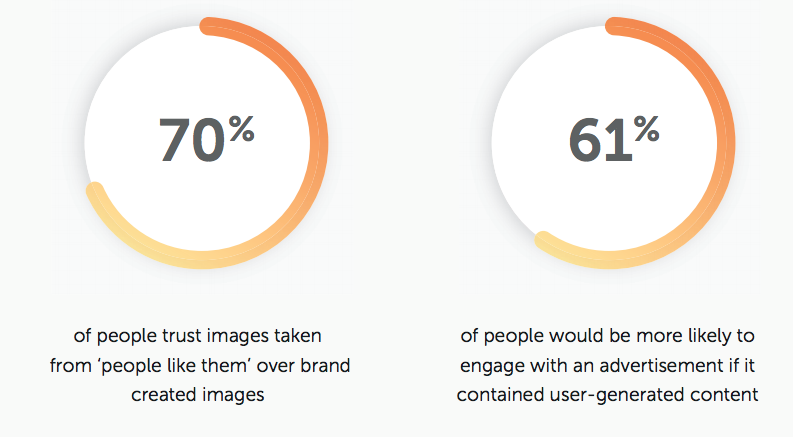
As you can see from these numbers, encouraging users to share images will be beneficial as well. It’s only natural to use this information to your advantage when you’re setting up a contest.
If you have never run a contest before, you may not know where to start. That was my inspiration for writing this guide.
I’ll explain how you can run a profitable contest that encourages user-generated content.
As a result, you’ll be able to generate more leads and ultimately increase your profits. Here’s what you need to do.
Pick a prize
The first step in running a contest is determining what the winner will get.
This may sound simple, but it still requires some thought on your end. The more valuable the product, the more likely people will participate.
For example, if you’re giving away a t-shirt, it won’t get anyone very excited. But if the contest winner receives something like a new camera, drone, or pair of sneakers, it’s much more enticing.
I’m not saying you need to give away the most expensive product your company sells, but make sure your prize is worth the time and effort required for people to enter.
This will help you get greater participation. Just look at how the value of your prize impacts the engagement rates:
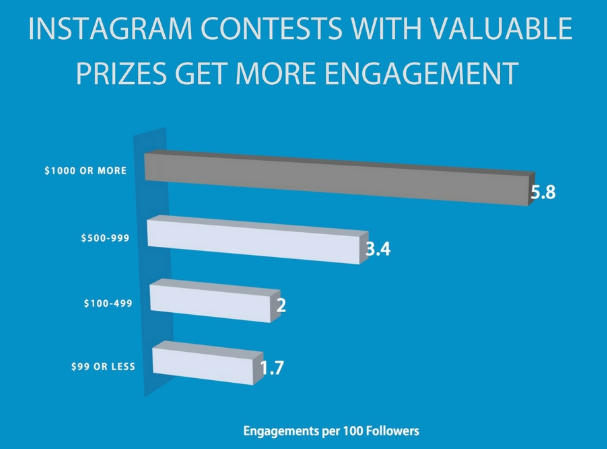
Your prize also needs to be appropriate. For example, let’s say you have a business that primarily targets teenagers. You probably shouldn’t be running a contest for a free trip to Las Vegas.
It’s not appropriate for your audience, and it doesn’t speak to them. Instead, giving away one of your newest products is a much more reasonable prize idea to consider.
Make sure your prize is related to your marketing goals.
Ask yourself what you’re trying to accomplish and promote with each contest: a product, service, or event. The prize should align with these goals as opposed to being a random giveaway item.
Establish the rules
Your contest needs to have clearly established rules.
Explain how people can enter to win. Come up with a deadline for entries.
Narrow down the eligibility of your contest, based on things such as age or location. For example, depending on the prize and your brand, you may be offering the prize only to residents of the United States who are at least 21 years old.
Let people know that purchases aren’t required to enter and that making a purchase does not increase the chances of winning the contest.
The criteria participants are being judged on need to be clear as well. Here are some examples to consider:
- best photo based on judges’ discussion
- photo with the most likes
- comment with the most likes
- highest number of retweets
- most number of shares
I like it when brands use criteria such as likes or shares to determine the winner as opposed to relying on a judge’s decision. That way it’s clear to everyone who won, and people won’t think you’re playing favorites. But I’ll leave that for you to decide.
You also need to share the odds of winning, privacy laws for revealing the identity of the contest winner, and the date and time the winner will be announced.
All of this needs to be clear so that it’s fair and everyone understands the rules. Otherwise, there could be some confusion.
For example, let’s say you run a contest in which the winner is determined by the comment with the highest number of likes. But you forget to set a deadline.
You pick a winner, but a few weeks later someone else gets more likes on a new comment. How will you handle that?
You won’t take a prize away from someone who already won. But you won’t want to tell the other person it’s too late because it could hurt your relationship with them.
You may be forced to give away multiple items. This confusion will be avoided if the rules are clearly established.
Select a platform
How will you run the contest?
- Snapchat
- Website
All these options may seem viable, but remember, you’re trying to encourage user-generated content. That’s why you need to choose platforms where participants can see submissions from other participants.
Social media works best for this purpose. Running a contest on social media will help your account grow faster.
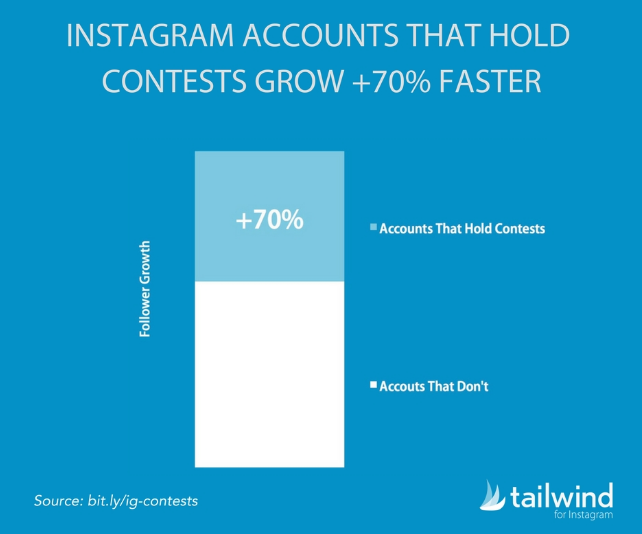
Platforms such as email and Snapchat wouldn’t be helpful for this type of contest.
You can still use your website to run a contest based on UGC. Just use the forums section or a dedicated landing page for user submissions.
Running the same contest on multiple platforms and selecting a winner from each one is also an option. Or you could run the contest on just one platform but promote it on all your distribution channels.
For example, if you’re running a Facebook contest, you can use Instagram, Twitter, your website, and email list to promote it.
You want to pick the platform that will generate the best response. If you have 1,000 Twitter followers and 20k Instagram followers, it obviously makes more sense to run your contest on Instagram.
Create a unique hashtag for the contest
Use hashtags as a promotional tool. It’s a great way for people to enter your contest.
For example, let’s say you’re running a contest on social media with user photos. You are encouraging participants to upload images to their personal profiles.
But how will you find them to judge them? By having the participants add a hashtag to the caption.
This strategy has many benefits. For starters, it will keep you organized so that you can run a fair and legitimate contest. It will be clear to everyone who enters.
But it also puts all those pictures in one place.
Now people who enter will see the photos submitted by other people who don’t follow your brand or follow people who submitted the photo.
This helps increase brand awareness and grow your social media following.
If you’re struggling to think of a good hashtag, you can use an online tool such as All Hashtag to help you generate one:

Be creative, but keep it simple.
Think about the readability of your hashtag. You can capitalize the first letter of each word to make it easier for people to read and understand.
Run contests encouraging likes, comments, and shares
This addresses the user-generated content aspect of contests—your ultimate goal.
If you run a contest on Instagram and tell your followers to enter by sending you a direct message, this action will not create UGC. But encouraging people to like, comment, and share will definitely do the trick.
You want them to complete these actions on your posts as well as their own.
Run photo contests or best comment contests. Reward people for getting the most likes or shares on their posts.
These are all great ways to encourage user-generated content.
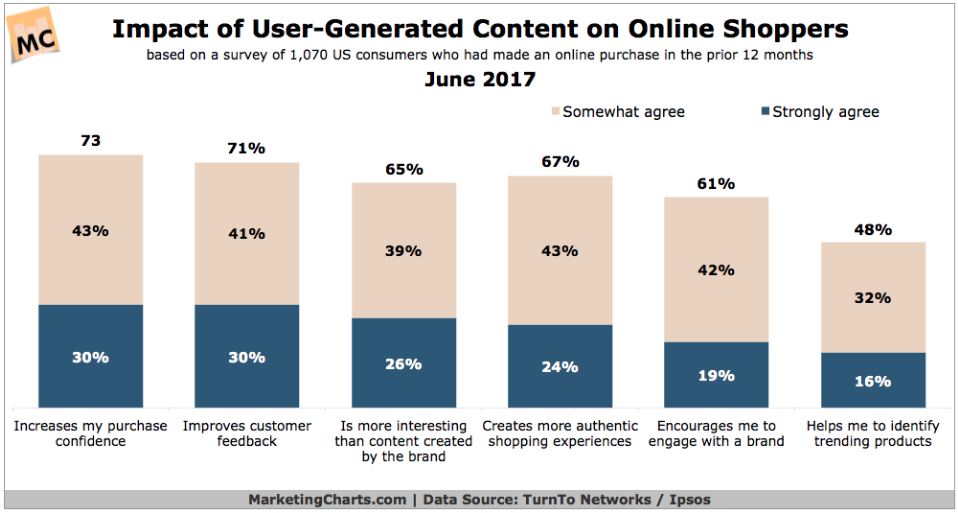
As you can see from these numbers, user-generated content will ultimately help you boost ecommerce sales on your website.
The numbers above show that UGC increases the chances of online shoppers making a purchase. That’s because your promotion stays on their minds.
They may not visit your website every day, but they’re active on social media.
The contest serves as a reminder of your brand. Even if people aren’t participating, they’ll still see it.
Promote your contest
You’ve launched your contest, posted the rules, and set a deadline. That’s great.
Now what?
Don’t just set it and forget it. Continue posting updates and reminders about the contest. Leverage all your distribution channels for this.
- Create a video promotion.
- Blog about it.
- Send an email to your subscribers.
- After someone makes a purchase on your website, direct them to a landing page promoting the contest.
- Use a live video promotion to build hype for your contest.
- Post daily reminders on your Instagram story.
Your followers may not have seen your original post from last week. But your story can serve as a countdown and constant reminder that you’re running the contest.
All this will help you get the highest number of participants and ultimately the most user-generated content.
Leverage relationships with social influencers
Influencers can help you promote your contests through their profiles.
Now your contest will be shown to a new audience, who may not know you or follow your brand on social media.
Have influencers promote contests the same way you did. Tell them to share the rules, set a deadline, and promote the hashtag.
The idea behind this strategy is to create social proof:
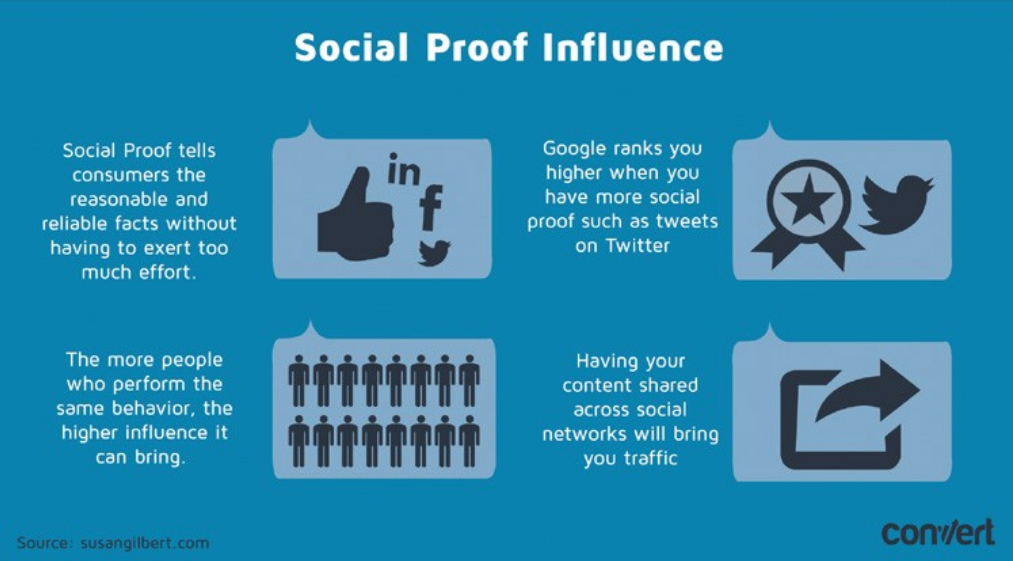
People are more likely to trust and follow recommendations from real people whom they follow on social media.
You can approach this strategy in a couple of ways:
- You could have influencers direct their followers to your page. They’ll use the same hashtag, entry rules, and deadline you’ve established.
- You could let the influencers run their own contests. Create a new hashtag, deadline, and prize for them to give away.
Now more people can participate even if they don’t want to follow your brand.
Running multiple contests increases the number of participants and the amount of user-generated content created for your company.
Pick a winner
When someone wins the contest, you need to take the time to announce it. Make this seem like a big deal.
Share the winning entry so everyone can see it. Tag the winner’s social media profile.
Just make sure to clearly describe all these aspects of your contest in your original rules. You don’t want to violate someone’s right to privacy without their permission.
Announcing the winner will have many benefits.
First of all, the winner will feel great, enjoying the praise. As a result, they will become a loyal customer and will be more likely to buy from you in the future.
They may even share a “thank you” post that will be seen by their followers.
Announcing the winner also shows people your contest is legitimate. Take a look at this Mint blog post, announcing a contest winner:
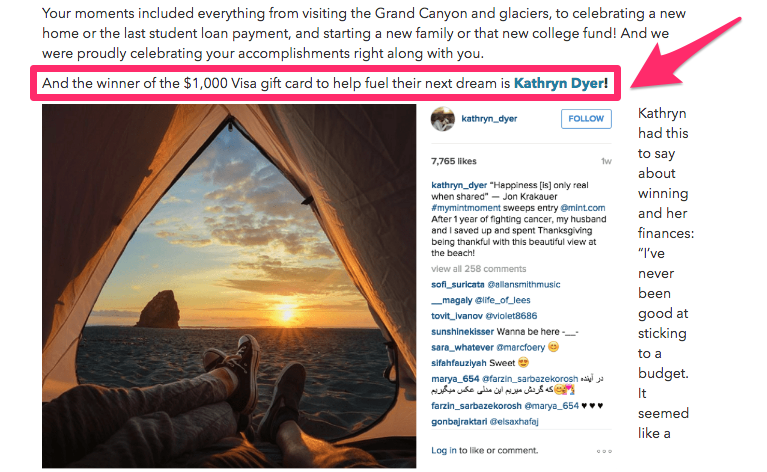
As you can see, Mint tagged the user profile and shared a screenshot of the winner’s post.
Now people know the contest was real and a real person won. Anyone can verify this by clicking the profile and referring to the entry.
This also gives more people an incentive to enter contests run by your company in the future. They’ll want to get the same praise and recognition for their efforts as this winner did.
Run contests on a regular basis
If you run lots of contests, you’ll generate tons of UGC.
Switch things up. Try running contests on different platforms to see which ones work the best.
Change your prizes.
After running several contests, you’ll be able to tell which ones had the highest participation.
I’d say it’s in your best interest to leverage your social media accounts for contests.
It’s a great place to encourage user-generated content, and it promotes brand loyalty: 53% of people who follow brands on social media are more loyal to those companies. Those are the types of people whom you want to target.
Once you figure out which contests were the most successful, you can continue running those.
Conclusion
Contests are a great way to build brand awareness.
But running contests that encourage user-generated content is even more effective because they can ultimately drive sales for your business.
Select a prize with a high value and relevance to your target audience. Otherwise, people won’t have an incentive to participate.
Explain the rules so everyone is on the same page. This will help you avoid confusion down the road.
Decide which platform you want to run the contest on. You could even run a contest on multiple platforms.
But no matter what you decide, you’ll need to promote it on all your distribution channels. Use social influencers to help spread the word as well.
Come up with a unique hashtag for each contest. Run contests that encourage likes, shares, and comments.
Make it seem like a big deal when you announce the winner.
Continue to run more contests in the future to get the most user-generated content for your brand.
What platforms does your brand use to run contests that encourage user-generated content?
from Quick Sprout https://ift.tt/2PyIUZ9
via IFTTT
No comments:
Post a Comment